Director: William Wyler
Screenplay: Dalton Trumbo
Starring: Gregory Peck, Audrey Hepburn, and Eddie Albert
Images from the 2008 Paramount Centennial Collection release.
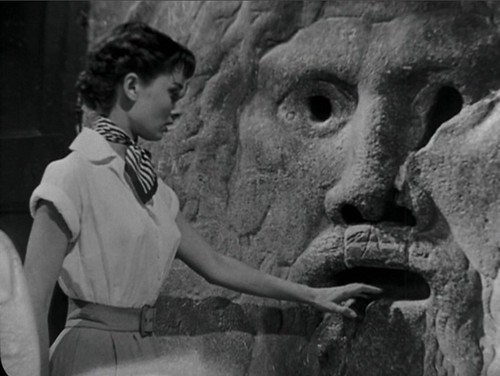
"I will treasure my visit here in memory as long as I live."
- Princess Ann/Anya/Smitty
Roman Holiday is a little gem of a film. It is a romantic comedy, a Roman travelogue, and an affirmation of the little things that make life worth living. It lacks the naivete of most romantic comedies, and is ready to accept reality at the cost of fantasy. At the risk of pretension, I'm fond of calling Roman Holiday a "neorealist fantasy." It is a fantasy bookended by reality just as The Purple Rose of Cairo is, and it acknowledges this reality while embracing the moment of fantasy, just as a movie goer embraces the joy of the moment in the theater.
The story has been told over and over. Audrey Hepburn is Princess Ann of an unnamed country on a goodwill tour around Europe. Tired of her confinement to formality, she decides to break free (while fighting the spell of sleeping medicine) into the city of Rome. Gregory Peck plays Joe Bradley, a newspaper man who hopes to get the scoop of a lifetime after unwillingly having a half-asleep Ann tag along home. He is aided by his photographer buddy Irving Radovich, played by Eddie Albert in what I believe is one of the better supporting performances out there. The rest is a series of adventures, laughs, romances, and goodbyes.
What makes the film great for me is the ending. More so than the wonderful sights of Rome, the delightful and lighthearted comedy, or the terrific cast. All these things are very endearing, but what elevates the film to something grand is the ending. If Roman Holiday had went with a phony, romantic, Hollywood Happy Ending, it could've been pretty mediocre. Not to say the ending is at all bleak, as I find it very uplifting and an affirmation of human virtuosity. I like to think of Roman Holiday as a light-weight Casablanca, because both end on a poignant, bittersweet note. In that regard, I'm inclined to think of romantic films as I would chocolates. When you're young and naive, you prefer the ending where Joe and Ann end up together. It's extra sweet, like a cheap, mass-produced chocolate loaded with sugar, and it feels right when you're watching it, but the taste is fleeting. The ending to Roman Holiday is more like dark chocolate.
I'm not averse to happy endings. I just feel that most movies tack on the happy ending as a way of pleasing the widest audience and selling the most tickets, which is one of my reservations about the recent Slumdog Millionaire. In fact, I'm more turned off by excessively bleak endings. Kurosawa's Ran, for instance, is a masterpiece and I'm in awe of it, but watch it every day for a week and see how you feel.

What makes Roman Holiday work for me is that it straddles the line between reality and fantasy in a way that is not at all phony or cheap. There is a scene when Ann is at a ball, and as she greets the guests, we cut to shots of her stepping out of her shoes from beneath her skirt. Or the touching scene where Ann recites her schedule for the next day with the Countess, and as she says her thank yous and no thank yous, she breaks down from the madcap absurdity. It's little details like these that make Roman Holiday special.
Roman Holiday was shot on location (partly why I want to call it a neorealist fantasy), and for me, it's the straight direction from William Wyler that makes it work. I've read people complaining that the vespa ride was not exciting enough, but for me, it works better from a more objective standpoint rather than have the camera whizzing around in what Billy Wilder would call: "fancy schmancy shots." It's this simple shooting style that gives Roman Holiday a restraint and control that anchors it to reality while not limiting its entertainment value.
In a way, I feel a bit like William Wyler felt about his range of shooting locations, in that I have a tough time deciding which screenshots to show, since the locations are all so warm and inviting. Joe's apartment, for instance, doesn't feel like a set, but an actual apartment.
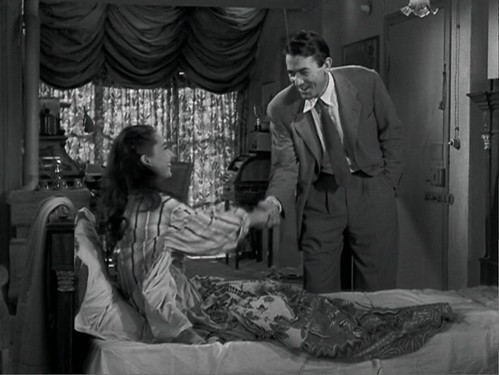
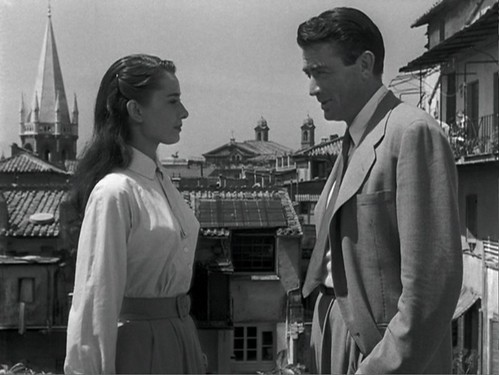

The casting of Roman Holiday is impeccable. The film seems to garner the most attention for Audrey Hepburn's breakout role, but we mustn't forget how well Gregory Peck works as well. He's a much more passive and identifiable actor than Cary Grant, who was originally considered for the role. With all due respect to Mr. Grant, I cannot see him as Joe Bradley. Gregory Peck seems more grounded and reserved, and while a big movie star, he can cede the center of attention more easily.
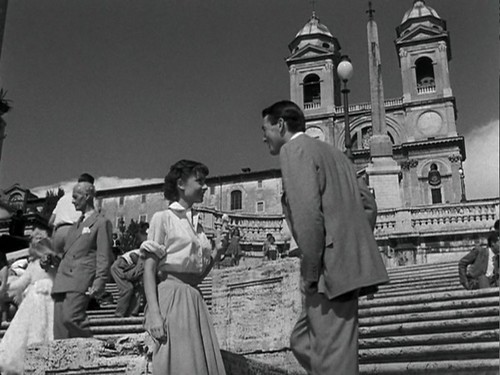
It helps that Audrey Hepburn's star power is already evident this early in her career, and Gregory Peck requested that she receive equal billing. Standup guy, right? Peck's comedic style is subtle. Almost bashful, really, and I think this only helps Roman Holiday. For me, subtle nuances in acting go a lot further and give the performance a genuine feeling of reality more so than overacting, although there are certainly some excellent performances of that type (think George C. Scott in Dr. Strangelove).
The film is commonly known as Audrey Hepburn's first lead role, or Audrey Hepburn's Oscar winning role, and while I think the film is great for much more than just her performance, I really can't deny it. Girl's got talent, what can I say? Of course, I'm wary of checking out films just because it has a certain actor in it. I can appreciate a bad Hitchcock movie more than I can appreciate a bad Audrey Hepburn movie. Sabrina is one I found extremely disappointing for an Audrey Hepburn film, a William Holden film, a Humphrey Bogart film, and a Billy Wilder film. Cram too many "Oscar winners" into the trailer and you'll sell tickets, but that doesn't make a good movie. But at least Sabrina is tolerable and even enjoyable if you can forgive its many, many shortcomings. Breakfast at Tiffany's, on the other hand, is often cited as Hepburn's signature role, but after seeing it recently, I can honestly say it's mediocre at best, and intolerable at worst. But I digress.
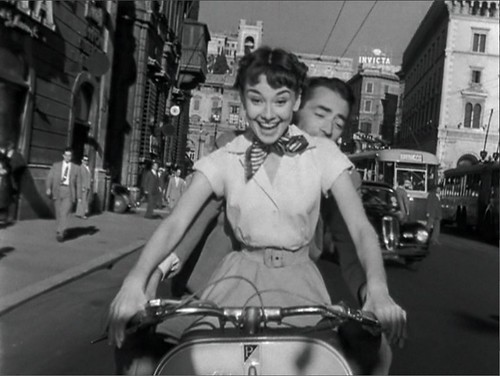
What cements Hepburn's appeal in my mind is her effervescence. There is something especially genuine about her in Roman Holiday. Watching her in the film makes me want to go outside to the bus stop and hug complete strangers. Perhaps this was Wyler's strategy. After all, it is a well-known story of how he filmed her naturally without her knowledge that led to her being cast for the part.
It's interesting how Hepburn spends almost half of the film asleep. When you think about it, the tour around Rome is maybe 30 minutes long. I'm almost inclined to compare it to Hitchcock's idea of suspense. I was waiting for the Roman tour for quite some time, but by delaying it, the scenes are that much better. The scenes are short, yes, but they are valuable little treasures. Describing them all would be pointless, so I'll select a few. For me, the moment where the film shifts gears is when Ann sheds off her shell in a snazzy new 'do.
Prior to this, her hair seemed to weigh her down, as well as the film itself too.
One of the best known scenes in the film is where Joe takes Ann to the "Mouth of Truth." As the story goes, stick your hand in it, tell a lie, and your hand will be bitten off. The scene works on more levels than it would in most other romantic comedies. The easy one is that Ann is lying about her identity. Likewise, Joe is white-lying about his motives. There is also the idea of phoniness present in regality, as well as the lies told in the press (something Joe acknowledges to his boss). Then we get to the idea of film itself and how truthful it is, in both the shooting, editing, and acting. Combine this with Wyler's direction on real locations in Rome, as well as Peck and Hepburn's improvisations, and you've got a two minute scene that's doing so much work.
Need I quote Godard again? - "Cinema is the most beautiful fraud in the world."

The role that completes the film for me is Eddie Albert as the photographer, Irving Radovich.
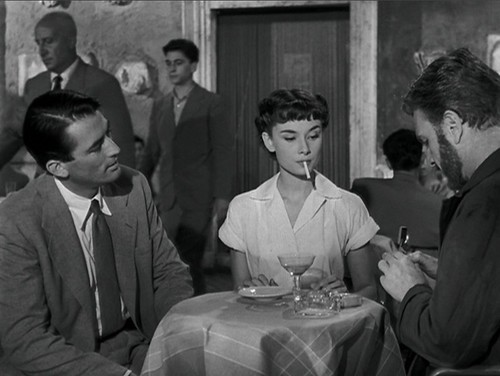
Film noir often deals with the idea of fleeting happiness in the face of a darker world. While not a film noir in any regard, Roman Holiday can be seen as fantasy in the face of reality. This is why the title of Roman Holiday is so perfect. Holidays have necessary expiration dates, or else they cease to be a holiday. What we do take back from a vacation, or any momentary reprieve from reality for that matter, are the little things. Little souvenirs, photographs, and above all, memories. For me, film is great because it can be enjoyed while you're watching it, but also when it's just thought about in memory. Films are like little vacations, and I think that's why the pictures in Roman Holiday are so important.
Pictures, as the old saying goes, are worth a thousand words apiece...
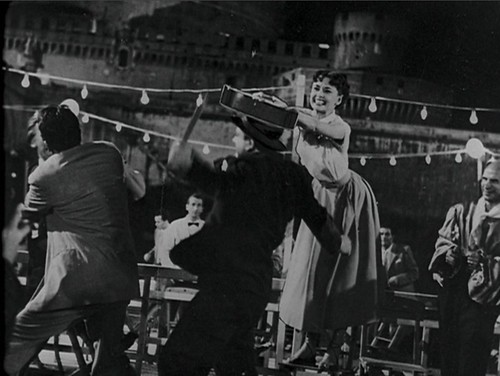
More than just generating keepsakes, Eddie Albert also provides valuable humor to the film's already bubbly surface. I always get a kick out of Joe spilling his drink on Irving to prevent him from spilling any beans. I also enjoy his guerrilla style of picture taking, such as driving a car while taking shots (this actually mirrors Wyler's shooting style as well):
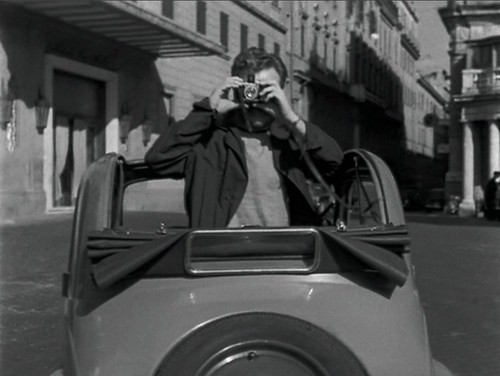
I think the idea of "don't sweat the small stuff" is a well intentioned, yet flawed, philosophy. In Roman Holiday, I feel the details are what make it special. I'd go so far as to say that about any film (I am particularly aware of this in Kieslowski's Three Colors). Whether it's Irving's lighter/camera, or the way Ann greets members of all nationalities, or the way the barber adjusts Ann's bangs, I think it's the details that make life worth living, good or bad (at least, detail's are part of it). Maybe that's why I find Gregory Peck so appealing. His humorous moments are somewhat awkward and are less like punchlines and more like little nuances of his character.

I've heard people complain that Roman Holiday is not a good romance. To me, it couldn't be better. Most romances seem to chug along, going through the motions to that inevitable conclusion. Romance, in my mind, has more to do with the mystery of love than love itself. That is, the lack of a relationship is as much a part of romance as the presence of one. I think the last thirty minutes or so of Roman Holiday come to terms with romanticization coupled with reality very well.
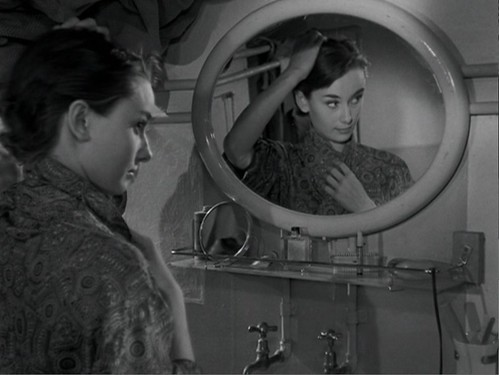
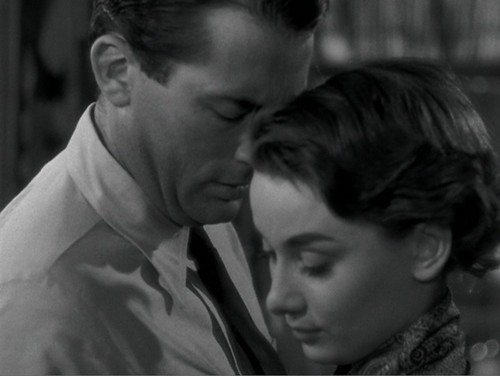
What distinguishes Roman Holiday from the likes of Sabrina or Breakfast at Tiffany's is that the ending is not mired in naivete, but grounded in reality. I feel the same way about Martin Scorsese's period masterpiece, The Age of Innocence. I get the feeling that the people presented in the film have a nobility to them that seems to be lacking these days. Rather than choose themselves, the characters must first consider the consequences of their actions. This gives the ending a poignancy that's absent from more traditional hollywood fare like Sabrina.

The acting, as well as the writing, is terrific in the final scene. The subtle sideways glances resonate more strongly than any open expression of feeling. Admittedly, I made a cardinal error when I saw Spartacus, which was written by the blacklisted Dalton Trumbo (who wrote Roman Holiday's script). I did not buy the absolute nobility of the slaves (which Stanley Kubrick also disapproved of), and dismissed Trumbo on this one script. His screenplay for Roman Holiday, on the other hand, works very well. It lacks the phoniness of Spartacus and it still seems fresh.
To be honest, I was gripping my seat as I watched this shot:
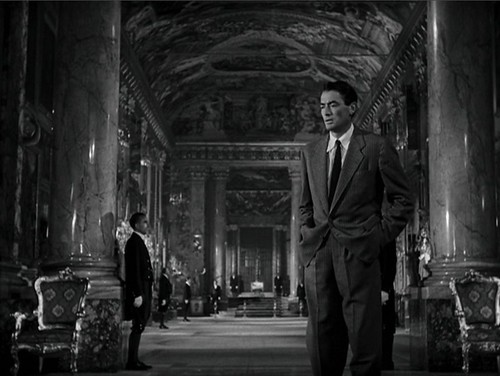
In a lesser film, I feel we would've had Ann bursting into that room, which Joe is in some way hoping for. But thankfully, Roman Holiday ends on a perfect note. The film really is a cinematic treasure, and it's the way that it combines reality and fantasy in a believable way that elevates it to something more than just a romantic comedy.
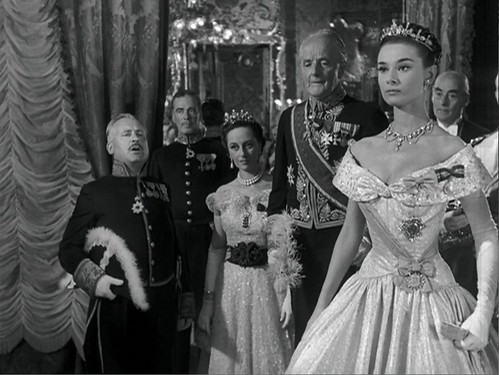
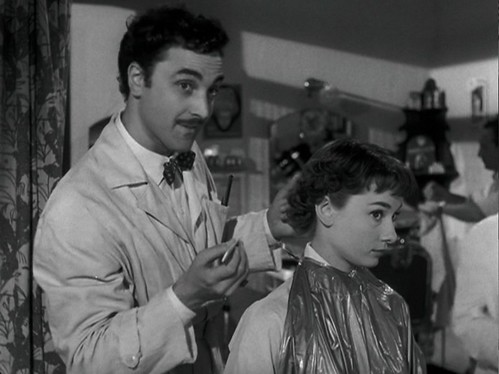
Well said, truly!
ReplyDeleteYou've helped me "get-over" this bittersweet ending that's awkwardly gathering momentum somewhere in my throat. I do not deny that I lack the maturity to fully reach this type of conclusion, and you've helped it all be quite cathartic.
Yet, somehow, I'm moved to tears, I can't help it.
Thank you.